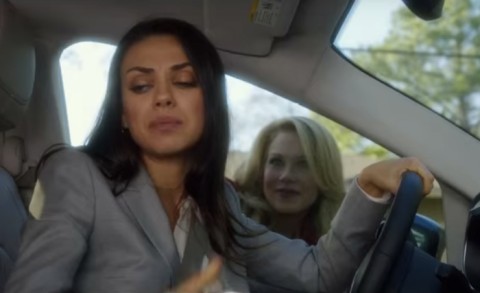A rebel mom and her nemesis
It’s too bad that Bad Moms sets up its conflict as one between women.

Amy seems to have it all—a lovely home, two adorable kids, a happy marriage, and a hip job. But in the film Bad Moms, that image of perfection shreds. Amy, played by Mila Kunis, discovers online that her husband is cheating on her. She is unappreciated at work, her son is lazy and feels entitled, and her 12-year-old daughter is already breaking under the same kind of stress her mom is carrying.
Amy rebels and finds new friends Carla (Kathryn Hahn) and Kiki (Kristen Bell). Carla has never tried to play the perfect image game. She propositions dads in the school’s drop-off lane, and greets Amy with, “Hey, I know you. You’re that chick that always picks up my kids from school when I forget slash don’t want to.” Kiki is a lonely stay-at-home mom whose husband expects her to parent their four young children single-handedly.
Read our latest issue or browse back issues.
“We all work too damn hard trying to make our kids’ lives amazing and magical,” declares Amy. “Their lives already are amazing and magical. Let’s be bad moms!”
Amy and her friends battle with alpha mom and PTA president Gwendolyn (Christina Applegate), who dismisses Kiki with “Oh my gosh, she just got her sadness all over me!”
Gwendolyn is blonde, wealthy, and has a pair of sidekicks who help her control the school with an iron fist. We see her reigning over a three-hour “emergency” PTA meeting at which Gwendolyn wants to establish bake sale police to monitor the rules: “No BPA, no MSG, no BHA, no BHT, no sesame, no soy, and, of course, no nuts or eggs or milk or butter or salt or sugar or wheat.”
In response, Amy brings to the sale a box of store-bought donut holes. The other moms have brought handcrafted cupcakes and tiny homemade pastries.
The laughs in this film work because viewers can recognize a system that puts enormous pressure on women to perform to an unattainable standard. Lurking under the laughs in Bad Moms is the way this standard demeans women’s work and encourages women to focus on appearances instead of on substance, on socially approved femininity instead of on individual gifts and callings.
In her book A Woman’s Place: A Christian Vision for Your Calling in the Office, the Home, and the World, Katelyn Beaty critiques this false standard. She notes that the system demands that women either be “nurturing and self-sacrificing or ambitious.”
“Jesus,” Beaty writes, “dismantles that false dichotomy. We can be self-giving and self-driven, content with our circumstances, yet deeply discontent when those circumstances are filled with suffering and injustice. Rather than dismissing ambition outright, we need to ask what ends our ambitions serve and amplify those ambitions when they serve good, holy ends.”
What if we can work for our kids and for the world, in ways that suit our gifts and meet the world’s needs? A discussion of Bad Moms could help open that conversation.
Unfortunately, the movie sets up the battle as one between women—between Gwendolyn’s crew and Amy’s. The film does acknowledge that pitting women against women fails to get at the heart of the problems. It depicts absent fathers or husbands who fail to share the work of home and children. It shows Amy’s corporate job as a place where others exploit her competence and her willingness to serve. And it demonstrates how women themselves often police the standards that inhibit their own and others’ flourishing.
A version of this article appears in the September 28 print edition under the title “Moms behaving badly.”






